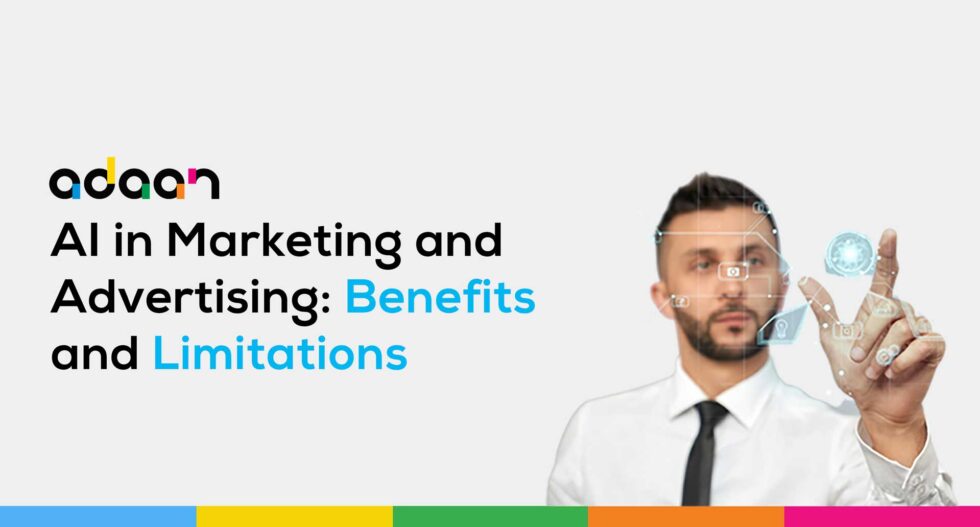Do you ever wonder how some ads seem to know exactly what you need, showing up in your social media feed or inbox at the right time? Well, the answer lies in the fascinating world of Artificial Intelligence (AI) in marketing and advertising.
With the latest advancements in deep learning, AI tools have transformed the landscape of all industries, including Internet marketing, offering businesses unprecedented opportunities to connect with customers in personalised and impactful ways. However, it is crucial to acknowledge that, like any technology, AI has its limitations and ethical considerations to be aware of.
From analysing mountains of data to predicting consumer behaviour, AI-powered marketing tools are changing the game for marketers and advertisers alike. But with great power comes great responsibility.
As we delve into the realm of AI in marketing and advertising, we’ll explore its incredible benefits and limitations while also unravelling the ethical considerations that come with it. So, buckle up as we embark on a captivating journey to uncover the secrets of AI in the dynamic world of marketing and advertising!
The Benefits of Using AI in Marketing and Advertising
Artificial Intelligence (AI) has revolutionised the world of marketing and advertising, bringing many benefits that can take businesses to new heights. With its incredible capabilities, Artificial Intelligence has become a game-changer, offering unparalleled opportunities to connect with customers in a more personalised, efficient, and effective manner.
Let’s take a closer look at some of the key benefits of using AI in marketing and advertising:
Amplified Personalization
In today’s digital era, customers expect personalised experiences from brands. AI-powered marketing algorithms can analyse vast amounts of data, including customer browsing behaviour, preferences, and demographics, to create highly targeted campaigns. This allows businesses to deliver personalised messages, recommendations and offers that resonate with customers on a personal level. From customised product recommendations to personalised content creation, AI enables digital marketing analysts to create hyper-relevant experiences that foster customer engagement and loyalty.
Automation for Efficiency
AI tools for marketing and AI tools for design can automate various tasks in Internet marketing and advertising, enabling businesses to streamline their operations and save time and resources. For instance, AI-powered marketing tools can optimise ad placement, bid management, and campaign budget allocation, freeing marketers to focus on more strategic activities. Automation not only increases efficiency but also allows for real-time adjustments and optimisations, ensuring campaigns are always performing at their best.
Data-Driven Decision-Making
Data analysis is a cornerstone of effective digital marketing and advertising strategies. AI can analyse massive amounts of data from multiple sources and provide valuable insights into consumer behaviour and market trends. By processing and interpreting data in real time, AI empowers businesses to make data-driven decisions. This enables marketers to identify patterns, trends, and opportunities, leading to more informed and effective marketing strategies.
Enhanced Customer Experience
The customer experience (CX) is key to building brand loyalty and driving customer satisfaction. AI-powered marketing tools can automate customer service processes, such as chatbots, providing round-the-clock support and resolving customer queries in real-time. Additionally, AI can analyse customer feedback and preferences to create personalised recommendations and offers. This level of personalisation enhances the overall customer experience, making it more engaging, convenient, and satisfying.
Cost Savings
Marketing and advertising budgets can be significant expenses for businesses. AI tools in marketing can help optimise ad spend by identifying inefficiencies and providing recommendations to improve ROI. Automated tasks, such as ad placement and optimisation, save time and resources, leading to cost savings. AI-powered tools enable businesses to make data-driven decisions, ensuring that marketing budgets are allocated effectively and campaigns are optimised for maximum impact.
The Limitations of Using AI in Marketing and Advertising
Like any other technological advancement, AI has limitations and challenges. Let’s look at some potential drawbacks of using AI in digital marketing and advertising and why businesses must tread carefully.
Oversimplification of Consumer Behaviors
Marketing is not just about numbers and data; it’s also about understanding human behaviour. Consumer behaviours are complex and influenced by numerous factors, such as emotions, cultural nuances, and individual preferences. While AI tools for marketing rely on data analysis and historical data to make predictions and recommendations, they may oversimplify these intricate behaviours.
For instance, an AI-powered marketing recommendation system may solely rely on past behaviours without considering evolving preferences or changing market dynamics. This can result in marketing campaigns that miss the mark and fail to resonate with customers, leading to suboptimal outcomes.
Ethical Implications
The use of AI in marketing and advertising raises ethical concerns that cannot be overlooked. The massive amount of data collected and processed by AI algorithms, including customer information, browsing behaviour, and personal preferences, raises questions about privacy, data security, and fairness. Businesses must ensure that this data is collected and used ethically and competently.
Additionally, there is a risk of bias in AI algorithms, leading to discrimination or unfair targeting of certain groups of customers. For example, if an AI-powered tool unintentionally excludes a particular demographic group from marketing campaigns, it can lead to unintended discrimination and backlash, causing reputational damage to the brand.
Loss of Human Touch
Marketing is not just about delivering messages; it’s also about building genuine connections with customers. Human emotions, empathy, and intuition play a vital role in understanding and meeting customer needs. Relying solely on AI tools in marketing may result in a loss of that human touch.
For instance, automated chatbots may not fully understand and address the emotions or nuances of customer queries, leading to impersonal interactions that fail to meet customer expectations. Finding the right balance between AI-powered marketing automation and the human touch is crucial to ensure a positive customer experience and maintaining a strong brand-customer relationship.
Dependence on Data Quality
The accuracy and quality of data used to train AI algorithms are crucial to their effectiveness. If the data is incomplete, biased, or outdated, it can lead to inaccurate predictions and recommendations. For example, if an AI algorithm is trained on biased data, it may perpetuate those biases in marketing campaigns, resulting in unfair targeting or exclusion of certain groups of customers. Ensuring data quality and integrity is a constant challenge in the era of big data, and businesses must invest in robust data governance practices to mitigate the risks of relying on flawed data.
Complexity and Cost of Implementation
Implementing AI in marketing and advertising can be complex and costly. Developing and training AI algorithms requires specialised expertise, sophisticated infrastructure, and significant investment in technology and data resources. Small and medium-sized businesses may face challenges in adopting AI due to the costs associated with implementation and maintenance.
Moreover, integrating AI into existing marketing workflows and systems can be daunting, requiring careful planning and execution. Businesses must carefully evaluate AI implementation’s potential benefits and costs to make informed decisions.
The Future of AI in Marketing and Advertising
In the future, marketing campaigns will not just be targeted but hyper-personalized to each customer, leading to unparalleled engagement and conversion rates. With the power of AI tools, marketers can automate repetitive tasks, gain deep insights from data, and optimise their strategies, all while adding their unique touch of creativity and intuition. This is the future of AI in digital marketing and advertising, and it is not a distant dream but a rapidly approaching reality.
There is no doubt that AI will continue to evolve and improve in marketing and advertising. With advancements in deep learning, natural language processing, and computer vision, AI can analyse vast amounts of data to uncover previously unimaginable insights. It can even decipher complex patterns in consumer behaviors, predict future trends, and optimise marketing campaigns in real time.
AI algorithms are constantly learning and refining, becoming more accurate and precise with each iteration. The potential for AI in marketing and advertising is akin to a snowball rolling down a mountain/hill, gaining momentum and size as it goes, and the possibilities are endless.
While AI can crunch numbers and analyse data with lightning speed, human marketers can bring their creative flair, empathy, and understanding of human emotions. The human touch in marketing is irreplaceable, as it involves crafting compelling stories, understanding cultural nuances, and connecting with customers emotionally. By collaborating with AI, human marketers can amplify their efforts and create marketing strategies that are truly awe-inspiring.
To fully realise the potential of AI in marketing and advertising, marketers must stay informed about the latest developments in AI technology. As AI evolves, it can bring new opportunities as well as challenges. Marketers need to understand the capabilities and limitations of AI and how it can impact their marketing strategies. They must stay updated on the latest trends, best practices, and ethical considerations related to AI in marketing and advertising.
Besides staying informed, marketers must cultivate a mindset of adaptability and continuous learning. The landscape of AI in marketing and advertising is constantly evolving, and new tools, platforms, and techniques may emerge. Marketers must be open to embracing these changes and willing to experiment, iterate, and learn from the results. The ability to adapt and stay ahead of the curve will be a key differentiator in the increasingly competitive marketing landscape.
Final Words
As we come to the end of our journey exploring the role of AI in marketing and advertising, it’s clear that this technology is changing the industry in many ways. On the one hand, AI can revolutionise every industry by providing data-driven insights, automating tedious tasks, and enabling hyper-personalized messaging. On the other hand, there are concerns about privacy, transparency, and the potential for bias in algorithmic decision-making.
Despite these limitations, the potential for AI to play an increasingly important role in the future of marketing and advertising is undeniable. As consumers turn more digitally savvy and demand more personalised experiences, AI can help brands deliver on these expectations by analysing vast amounts of data to uncover hidden patterns and insights.
With AI-powered marketing tools, brands can engage with customers in real-time, providing personalised recommendations and support. AI will continue to transform the marketing and advertising landscape in the near future. By leveraging this technology responsibly and ethically, brands can stay ahead of the curve and provide customers with the exceptional experiences they expect and deserve.
FAQs
What are the key benefits of using AI in marketing and advertising?
There are several benefits of using AI in marketing and advertising, including its ability to understand and assess vast amounts of data quickly and accurately, identify patterns and trends in consumer behaviour, personalise marketing messages and offers, improve the targeting and effectiveness of ad campaigns, and automate repetitive tasks to free up time for marketers to focus on strategy and creativity.
What are the limitations of using AI in marketing and advertising?
While AI has many benefits, there are also limitations to its use in marketing and advertising. For example, AI algorithms can be biased and make incorrect consumer assumptions, leading to ineffective campaigns. AI may also struggle with interpreting non-verbal cues and emotions, which can be important in certain marketing messages. Additionally, AI cannot replace the human touch regarding creativity, empathy, and building customer relationships.
How can marketers stay informed about the latest developments in AI technology?
To stay informed about the latest developments in AI technology, marketers can attend industry conferences and events, read industry publications and blogs, participate in online forums and communities, network with other professionals in the field, and take online courses or certifications to improve their knowledge and skills.
What are the potential ethical implications of using AI in marketing and advertising?
There are many potential ethical implications of using AI in marketing and advertising. These may include privacy and data security concerns, bias, and transparency. Moreover, AI algorithms may be biased against certain groups of people, leading to discriminatory outcomes.
What is the potential for a future symbiotic relationship between AI and human marketers?
The potential for a symbiotic relationship between AI tools and marketers is significant. While AI can automate repetitive tasks, marketers can bring creativity, empathy, and a deeper understanding of customer needs and preferences. AI and human marketers can create more effective and personalised marketing campaigns that drive better business results and provide better customer experiences.






